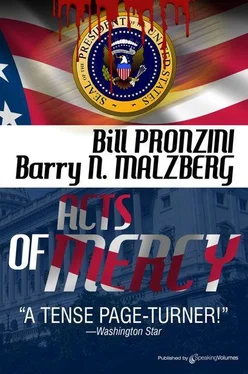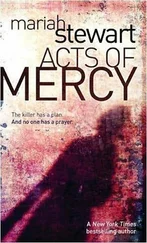Bill Pronzini - Acts of Mercy
Здесь есть возможность читать онлайн «Bill Pronzini - Acts of Mercy» весь текст электронной книги совершенно бесплатно (целиком полную версию без сокращений). В некоторых случаях можно слушать аудио, скачать через торрент в формате fb2 и присутствует краткое содержание. Жанр: Триллер, на английском языке. Описание произведения, (предисловие) а так же отзывы посетителей доступны на портале библиотеки ЛибКат.
- Название:Acts of Mercy
- Автор:
- Жанр:
- Год:неизвестен
- ISBN:нет данных
- Рейтинг книги:4 / 5. Голосов: 1
-
Избранное:Добавить в избранное
- Отзывы:
-
Ваша оценка:
- 80
- 1
- 2
- 3
- 4
- 5
Acts of Mercy: краткое содержание, описание и аннотация
Предлагаем к чтению аннотацию, описание, краткое содержание или предисловие (зависит от того, что написал сам автор книги «Acts of Mercy»). Если вы не нашли необходимую информацию о книге — напишите в комментариях, мы постараемся отыскать её.
Acts of Mercy — читать онлайн бесплатно полную книгу (весь текст) целиком
Ниже представлен текст книги, разбитый по страницам. Система сохранения места последней прочитанной страницы, позволяет с удобством читать онлайн бесплатно книгу «Acts of Mercy», без необходимости каждый раз заново искать на чём Вы остановились. Поставьте закладку, и сможете в любой момент перейти на страницу, на которой закончили чтение.
Интервал:
Закладка:
But like an undercurrent, thoughts and emotions kept tugging at him. Bewilderment: too many things happening too quickly, in a way and with implications that he lacked the capacity to understand. Furtiveness, wrongness: he was an officer of the law, he had dedicated his life to upholding it, and yet here he was, about to commit an act which was contrary to the very codes by which he lived. A sense of fatalism: he was not going to get away with this, there were too many things that could go wrong, too many obstacles to overcome. Faith in the President: if he had been surprised and disconcerted by the order to move Briggs’s body, he had also immediately understood and accepted Augustine’s explanation of why it was necessary. He knew well enough what would happen to him if he were discovered, but that did not bother him; the greater good was all that mattered. All that mattered.
When he neared the lighted window he stopped and drew a heavy, silent breath. Standing just outside the elongation of light, he looked back toward the west corner. Stillness. He moved his gaze across the lawn, past the dark squares of the helicopter landing pad, around toward the rose garden. Satisfied that he was alone, he bent at the waist and went quickly to the oleander bushes beneath the window, spread them cautiously with his hands until he had access to the press secretary’s body.
He pulled at the one outflung arm and it yielded limply; Briggs had not been dead long enough for rigor mortis to set in. Justice got a firm grip on the arm, another grip on the trousers at the hip, and dragged the body out of the bushes and across the bordering stones. The small rustling scraping sounds he made seemed unnaturally loud in his ears. He paused, down on one knee, and looked up at the illuminated second-story windows. They remained empty.
Justice rubbed sweat from his eyes, got a two-handed purchase on Briggs’s arm and hoisted the body up across his back in a fireman’s carry. The skin on his neck crawled where Briggs’s hair brushed it; he shifted the weight slightly until the head lay canted against his shoulder. Then he shoved up, and once he had his balance, once he was sure the body wasn’t going to slip, he began to run humped-over back to the west corner.
The muggy night air burned in his lungs and he could hear himself breathing in thin, ragged pants, but he did not break stride until he neared the corner. Ten feet from it he veered over to the wall and braced his free shoulder against it, got his breathing under control. He listened. All around him the night held its spring hush.
He put his head around the corner-and one of the civil-service guards was walking at an angle parallel with the far wall, toward where the Ford was parked under the portico.
Justice pulled his head back, stood tensed. Had the guard seen him? But he hadn’t been looking in this direction, had been moving at an easy pace with eyes toward the Ford. He let twenty seconds pass, heard nothing, and eased his head around the corner again.
No sign of the guard.
He stepped off the lawn, striding more rapidly than before because of the absence of shadow here, and when he neared the north corner the muscles in his legs and back were knotted from the weight of the body, the strain of running with it. Nothing to be done about that. He could not put it down, not here; it would take too much time, too much effort to lift it again, and he did not know where the guard he had seen walking was now.
The lights of a car drifted by the old Executive Office Building on Seventeenth Street, briefly touched the guard booths far down at the West Gate. There was no movement from that direction: he had not been spotted from there. Justice craned forward to peer out along the north wall, saw the one guard moving away past the carriage entrance. The other two guards who had been standing there were gone.
Setting his teeth, he made the run to the north portico and the rear of his car.
Three-quarters of the way there he felt his legs begin to give out. Panic gripped him; he had an image of himself sprawled out on the blacktop with the body beside him, people shouting and converging on him. He forced himself to slow to a staggering walk, saw the car loom larger ahead of him and automatically extended his left hand, reaching for it. His fingers touched the warm metal of the trunk, fumbled for the bottom edge and found it and lifted the lid just as a cramp buckled his left leg. He felt himself falling, twisted against the rear bumper-and Briggs’s body rolled off his back and inside the trunk.
Justice heard it hit something metallic, sending small, ringing echoes into the night, as he jarred painfully onto his right knee. The sweat on his body turned cold; he caught the bumper, used it to push himself half-erect. He dragged the trunk lid down, had to curb an impulse to slam it and pressed down on it instead until the lock clicked. Then he leaned against it and jerked his head around in desperate quadrants because he was sure he had just made enough noise to alert anyone within a hundred-yard radius.
He saw no one. Even the lone guard had vanished into the night shadows.
In the new silence he pushed away from the trunk, stood unsteadily for a moment. Pain throbbed in his knee; there was a prickly sensation of weakness in both thighs, both calves. He got his handkerchief out and mopped at the film of moisture on his face as he limped around to the driver’s door, opened it and moved inside. His hands trembled slightly on the wheel, but by the time he had gotten the car started and pointed toward the West Gate, they were steady again.
No one came running out of the White House; no one challenged him at all.
By the time he reached the gate his pulse rate had decelerated to normal. He had no trouble with the guards there; they knew him and passed him through with a brief exchange of amenities and only cursory attention to procedure.
The raw edge of tension left him as he drove slowly to Pennsylvania Avenue, turned northwest. He had done it; amazingly, in spite of the odds and his feeling of fatalism, he had gotten clear of the White House grounds with Briggs’s body and without incident. But the mission was not over yet. Something could still go wrong if he was not careful.
The President had told him that Briggs lived in a private house on Arden Place in Cleveland Park, out in the old county-a thirty-minute drive even at this time of night. Justice glanced at his watch: nearly midnight. Good. The later it was, the less likely the chance of anyone noticing him while he completed the transfer.
Traffic was light on Pennsylvania Avenue, and as he drove along it he found himself thinking strangely of the funeral procession carrying the body of President Kennedy to Arlington National Cemetery. Or maybe not so strangely at all. Weren’t he and his car, traveling part of the same route, also a kind of miniature funeral procession transporting the body of the press secretary?
A chill caressed his neck. He imagined that he could hear caissons, the thunder of drums, the clattering hooves of horses-echoes in his memory of that long-ago day in 1963. He had been nineteen at the time, attached to a military police unit stationed at Fort Benning; young and somewhat callous, not quite as stricken by the assassination as most of the country, as most of the other army personnel. He had spent a good part of those four days after the shooting drinking beer at the PX; routine had been completely disrupted, and for him and most of his company that had been an excuse for taking an extended pass. At the exact moment the casket had been taken out onto Pennsylvania Avenue-he remembered this distinctly-he had been standing half-drunk at the PX bar, watching television and arguing with two other MPs over whether the National Football League commissioner had the right idea in going ahead with the schedule on Sunday or whether it showed a lack of respect.
Читать дальшеИнтервал:
Закладка:
Похожие книги на «Acts of Mercy»
Представляем Вашему вниманию похожие книги на «Acts of Mercy» списком для выбора. Мы отобрали схожую по названию и смыслу литературу в надежде предоставить читателям больше вариантов отыскать новые, интересные, ещё непрочитанные произведения.
Обсуждение, отзывы о книге «Acts of Mercy» и просто собственные мнения читателей. Оставьте ваши комментарии, напишите, что Вы думаете о произведении, его смысле или главных героях. Укажите что конкретно понравилось, а что нет, и почему Вы так считаете.












